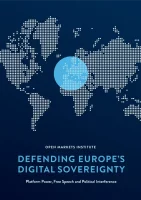Brussels — A new policy brief released today by the Open Markets Institute and the Center for Journalism & Liberty warns that Europe’s democracy, rule of law, and freedom of expression face growing danger from U.S. tech monopolies — and from a coordinated campaign by the U.S. government to undermine Europe’s digital sovereignty under the guise of “defending free speech.”

DIGITAL SOVEREIGNTY
Titled Platform Power, Free Speech, and Political Interference: Defending Europe’s Digital Sovereignty, the brief argues that dominant U.S. platforms such as Google, Meta and X wield unprecedented power to manipulate political discourse, censor individuals and organizations, and shape the flow of information across Europe, the United States and beyond. At the same time, and in coordination with these corporations, the current U.S. administration has launched an “unprecedented assault” on Europe’s right to regulate these corporations in the public interest.
“When a handful of corporations — aligned with a foreign government — control how people communicate, debate, and learn, the very foundations of democracy are at stake,” said Courtney C. Radsch, co-author of the report. “Europe and other nations around the world must act now to defend their democratic sovereignty and ensure that technology serves citizens, not the other way around.”
The brief documents how the White House, Congress, and senior U.S. officials have sought to pressure European leaders to weaken or abandon enforcement of the Digital Services Act (DSA) and Digital Markets Act (DMA) — while echoing the rhetoric of major tech firms that portray EU regulation as “foreign censorship” and “discrimination”. It warns that this campaign aims not only to shield U.S. corporations from accountability but also to destabilize Europe’s democratic institutions.
“This is not a mere trade dispute — it’s a struggle over who governs the information systems that underpin democracy itself,” said Max von Thun, co-author of the paper. “If Europe backs down, it will hand permanent control of its communications infrastructure to unaccountable foreign monopolies and their political patrons in Washington.”
The report calls for a robust European response to defend free expression, sovereignty and democracy, including:
-
Eliminating opaque recommender systems and other forms of algorithmically-manipulated speech and empowering users, not platforms, to decide what they see online;
-
Establishing comprehensive transparency and auditing requirements that enable citizens, business customers and governments to verify the neutrality of the platforms they rely on;
-
Restructuring the market to limit concentration of power over information flows and eliminate conflicts of interest, including separating ownership of critical communications infrastructure and publishing.
-
Promoting European alternatives to U.S. platforms through public investment, public procurement and the promotion of open digital infrastructure and standards;
-
Imposing genuine interoperability and data portability across the technology stack, particularly on social media platforms and AI systems, so that citizens have genuine choice over where they get their information.
-
Fully and robustly enforcing copyright laws to ensure that platforms provide fair compensation for the use of journalistic and other content.
-
Leveraging the EU Anti-Coercion Instrument and other trade measures to counter U.S. economic and political interference.
We will discuss these recommendations and more during a two day conference hosted by Open Markets and ARTICLE 19 in Brussels on October 15 and 16. Sign up to follow the livestream here.
